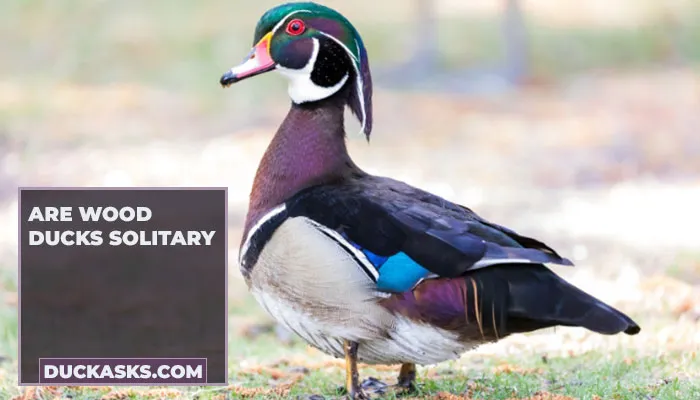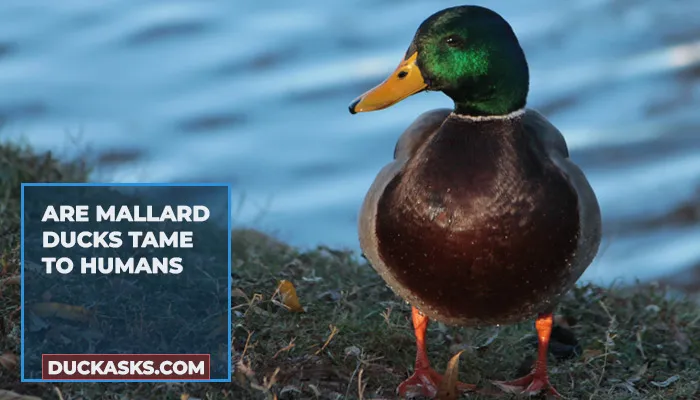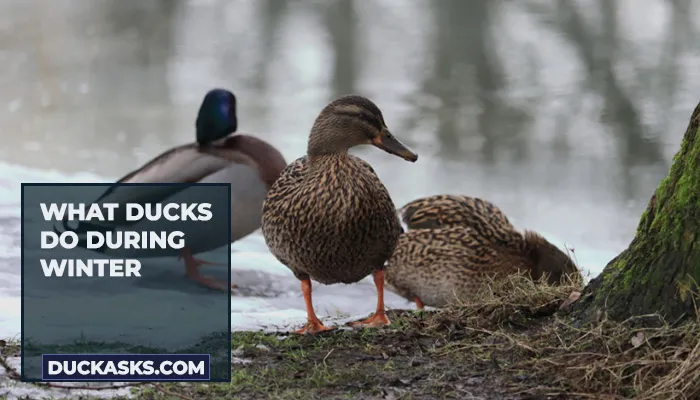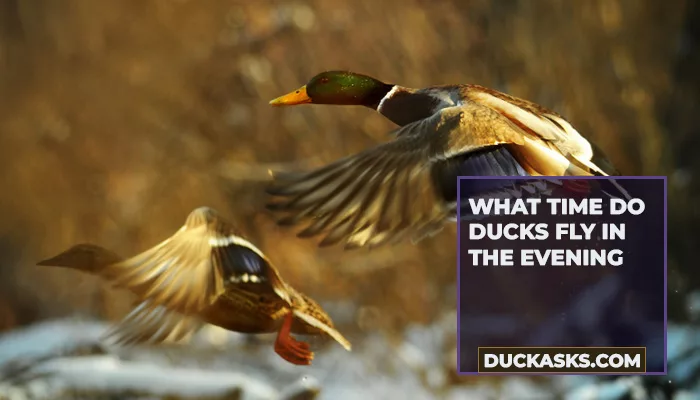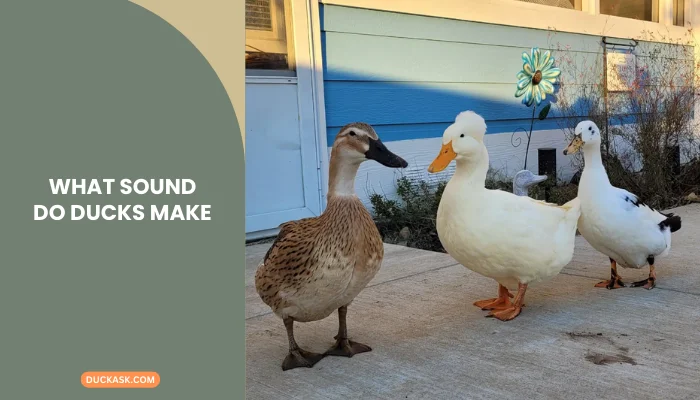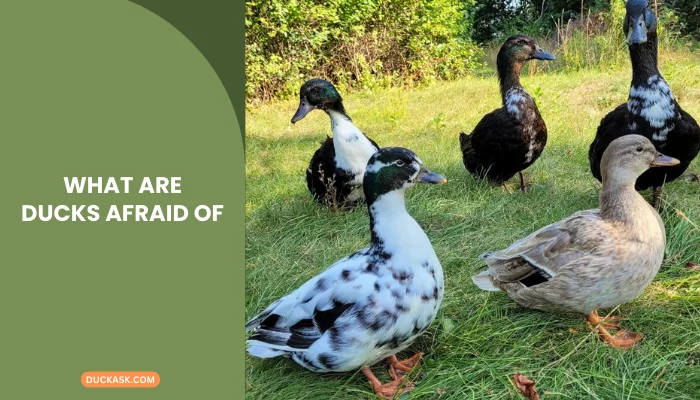Are Mallard Ducks Vegetarian?
You may see the average mallard duck around you in parks and your nearby countryside lakes or ponds, and you might want to feed them whatever human food you have in your hands.
But did you wonder what their diet is like? One might assume that mallard ducks are vegetarian like many others in their family.
But contrary to popular belief, mallard ducks are omnivorous and not vegetarian.
Mallard ducks will mostly stick to a vegetarian diet, such as seeds and plants in the ponds, but also consumes small fishes and bugs, making them not entirely vegetarian.
Read more about duck habits:
What Do Mallard Ducks Eat?
Mallard ducks, even if it is hard to believe, are omnivorous, just like us. Despite their preferences for plant matter, they often eat whatever they can forage in the ponds or the land around the ponds.
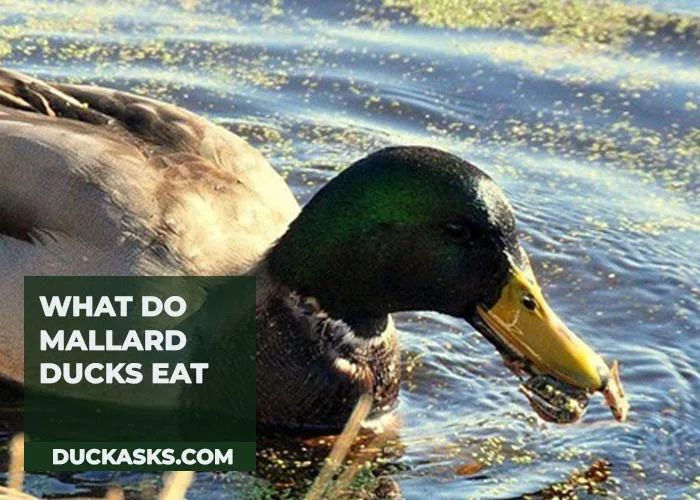
So, they are often known as opportunistic eaters.
01. Seeds and Grains
Seeds and grains are probably the favorite foods for these blue-green mallard ducks. An interesting trivia about them and seeds is that they are capable of helping the spread of plants through their digestive tract.
They do so by excreting the undigested seeds to different parts of the pond.
However, caution must be ensured when feeding grains to the adorable mallard ducks in your neighborhood ponds.
That is because they may not be able to digest all kinds of bread, especially the ones we consume, no matter how excited they seem to have it!
02. Aquatic Plants and Weeds
I am sure we have all seen ducks dunk half their necks into the water and suddenly come out of it with a bunch of pond weeds and underwater plants.
Their foraging nature means that they are not as picky and will eat whatever they find in those murky waters.
They enjoy the whole assortment of aquatic plants like pondweeds, grasses, sedges, or even the stems and roots of many plants growing in or around lakes and ponds. Some ducks also eat flowering plants.
03. Bugs, Mollusks, and Small Fishes
While foraging through the riverbeds or grasslands, the mallard ducks sieve through mud and dirt to obtain minor bugs, small fishes, and even some tiny crustaceans or invertebrates.
The mallard ducks sure have a diverse appetite!
These fishes or mollusks are a great source of protein for ducks. Especially in the winter, ducks living in rather colder regions prefer a diet filled with aquatic proteins.
The protein ensures that they can stay warm during the chilly months. Frogs, tadpoles, snails, or even earthworms can be part of the diverse mallard duck diet!
Young mallard ducks frequently consume more aquatic proteins, like aquatic insects, than adult mallards.
This might be because diving for food is considerably harder than foraging on land, and they need to learn how to hunt properly.
Additionally, young ducklings frequently require a higher protein diet because they are still in their growing phase.
04. Miscellaneous Foods
Other than the common waterfowl diet maintained by the mallard ducks, they also consume large amounts of corn, husked barley, or even oats. However, in the wild, these are not found lying around on the grass or in ponds.
So domesticated ducks on farms are given this sort of food. Mallard ducks also enjoy a variety of fresh leafy vegetables such as lettuce or cabbage.
Being free grazers, they will practically eat anything green and lush!
Fish eggs are also a part of the random diet of mallard ducks. It has been shown that ducks can pass viable fish eggs through their digestive tract, so even if they consume fish eggs, some might as well survive and live on to be full-grown fishes!
Pebbles, gravel, sand, and small shells are also consumed by ducks. These substances provide grit, which aids digestion.
Grit also contains nutrients such as calcium, which is essential for a healthy diet and the production of eggshells.
Why Might They Choose to Eat a Vegetarian Diet?
Mallards consume more aquatic plants and grasses during the summer months when plant life is abundant. This keeps them cool and hydrated during the hotter months and gives them the nutrients needed to shed feathers.
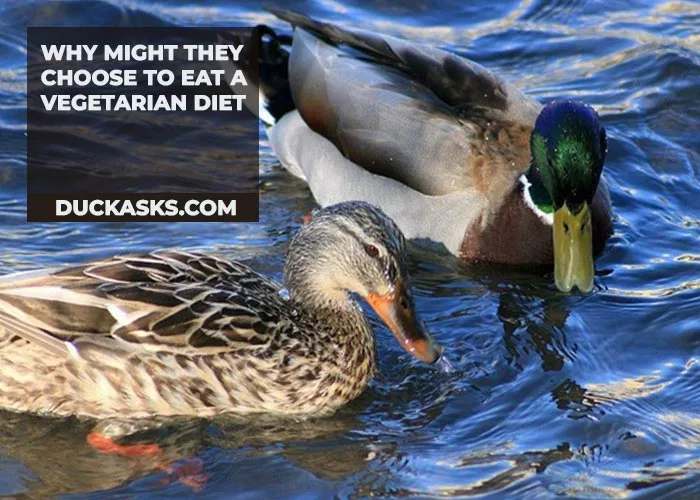
Another advantage of having a vegetarian diet for ducks is that most pondweeds or aquatic plants are soft and do not need much chewing.
Mallard ducks, like any other duck, do not have teeth and hence cannot chew food. The smaller the food and the easier to chew, the better for them!
Are All Ducks Vegetarian?
No! Ducks are not vegetarians at all. They consume all sorts of things. They are opportunistic free grazers and will practically eat anything you keep in front of them, even if they cannot digest it properly.
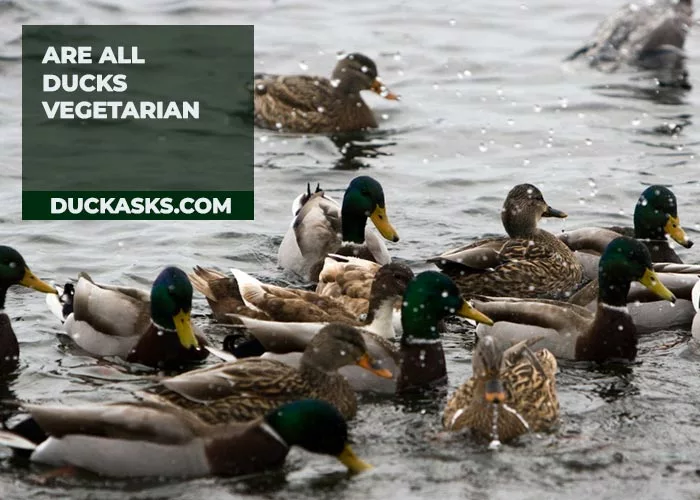
It is only a misconception that ducks are vegetarian when in reality, they are omnivorous.
What Affects the Diet of Ducks?
Ducks are a very popular type of waterfowl, and they have many unique behaviors and adaptations that help them survive in their natural habitats. While there are many different types of ducks, they tend to share some common characteristics.
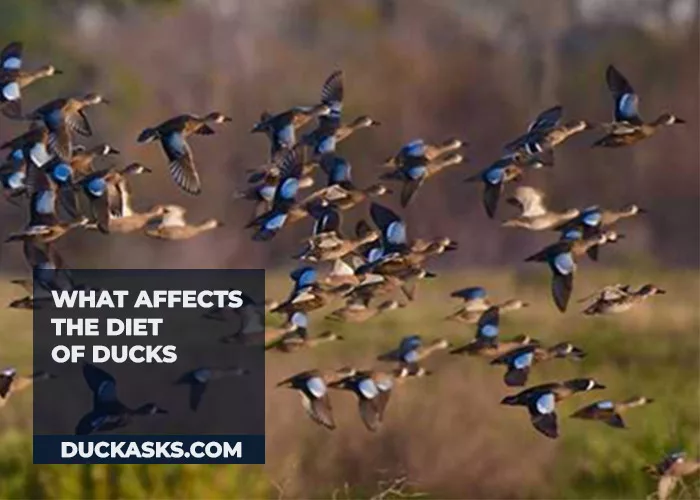
One such characteristic is their diets, which can vary widely depending on factors like the time of year, where they live, and the types of food that are available to them.
We will discuss some of the factors that can affect the diet of ducks, as well as how they deal with these changes in their food sources.
01. Breeding Season
During the breeding season, males and non-laying females only consume 37% of animal matter, whereas laying females take 71.9% of animal matter to meet their energy requirements.
Mallards supplement their diet with meat during the breeding season by eating gastropods, insects, crustaceans, and worms.
02. Migration Season
When migrating, mallards eat primarily vegetarian food, including seeds, acorns, aquatic plants, cereal crops, and in populated areas, bread and bird seed from humans. The diet of migrating mallard ducks varies with their location and season.
03. Season
Mallard ducks change their diet according to the season. For example, some ducks prefer a vegetarian diet in winter, whereas mallard ducks like a protein-rich diet in the colder months.
04. Ducks’ Habitat
Ducks raised in fields consume more plants and grains. Those who spend the majority of their time on the water will consume more crustaceans, amphibians, and fish.
What Do You Feed a Pet Mallard Duck?
You can give your pet mallard ducks anything that ducks in the wild would eat.
However, most of the time, the ducks sift through mud and water to find their food, so it would be quite difficult for us pet owners to find the same type of food.
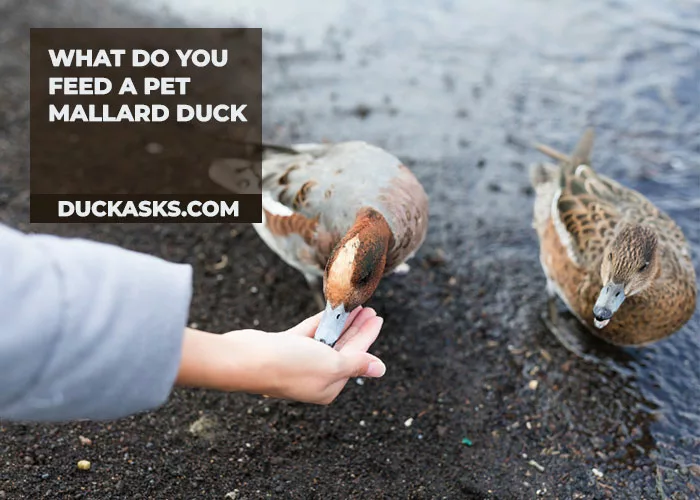
Since they enjoy a variety of fresh produce along with aquatic plants and shrubs, pet owners can owners have a lot of options.
Fruits like apples, bananas, tomatoes, or even berries can be given. Cucumbers, lettuce, corn, and grains are the most commonly used food items.
If you want to give your mallard duck some protein, leftover fish or even meat cut into tiny pieces can be mixed in with their water.
Conclusion
Despite the urge to feed mallard ducks bread and whatever leftovers we have, it is important to remember what their natural diet would look like. These almost vegetarian species of ducks will eat anything from seeds to plants to even frogs!
Now you know if mallard ducks are vegetarian or not! The next time you go to a pond with the intention of feeding ducks, you know what to take.
For more fascinating duck facts, keep an eye on our Facebook, Twitter, and Pinterest pages and become a duck connoisseur!
Image Credits:
- birdsoutsidemywindow.org/
- Canva.com/photos
Article References:
- https://a-z-animals.com/blog/what-do-mallard-ducks-eat/
- https://www.audubon.org/field-guide/bird/mallard
- https://www.birdsoutsidemywindow.org/2022/03/09/mallards-as-carnivores/

